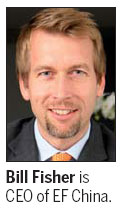The torch burns brightly for academies of English
Updated: 2012-09-14 09:47
By Wang Hongyi (China Daily)
|
|||||||||||
|
The training agency EF Education First has been benefiting from an increasing demand for English learning in China. Provided to China Daily |
Ambitions to speak the world language are fueling the growth of an industry
When a silver-haired Swede in his late 60s hit the streets of Guangzhou in his running shoes one May day four years ago, it was clear he had a special connection with China.
 |
The man was Bertil Hult, and he ran for 200 meters, decked in red and white and holding aloft the Olympic flame, having been selected as an honorary torch bearer by organizers of the Games in Beijing.
Not only did Hult have a business connection with China going back several years, but his company, EF Education First, had been selected as the official provider of language training for the Beijing Olympics.
The Games may well have acted as the perfect springboard for EF, because three years earlier it had about 60 schools in the country, and now has about 110 schools in almost 60 cities.
EF's growth mirrors that of the English educational and training market generally. According to industry reports the market has grown at least 10 percent a year in recent years, and is said to now have a turnover of 30 billion yuan a year. The figure is expected to exceed 40 billion yuan by 2013.
The increasing awareness by Chinese people of the importance of having a command of English has come on the back of the country's exposure to the rest of the world over the past 30 years, and language-teaching providers such as EF are only too willing to make the most of that.
It is that kind of thirst that has helped EF grow into what is claimed to be the world's largest private-education provider and has made Hult an immensely rich man. The company's website says Hult, who suffers from dyslexia, founded the company in 1965, and Forbes magazine in March put his personal net worth at $3 billion.
Apart from language teaching, EF specializes in educational travel and degree programs. It has a group of 15 products and non-profit divisions with offices and schools in more than 50 countries and regions, and 34,000 staff, faculty, teachers and tour directors.
While the Beijing Olympics may have been the catalyst for more growth by EF, the company had shown its faith in China at least five years earlier when it relocated its research and development center from Boston to Shanghai. It now has more than 250 software developers, linguists and educators there, their task being to blend technology into educational services.
In China, EF's CEO is Bill Fisher, who has lived in the country for 10 years. Fisher, the founding employee of EF's instructional-technology division in 1993 and of EF's e-learning division, Englishtown.com, in 1996, has overseen and contributed to the phenomenal success of EF's language-learning platform from its inception as a joint research project between EF and Apple Inc to its status today.
The online learning system, Englishtown.com, is available 24 hours a day at every level. Subscribers can receive up to 30 hours of online classes a month. Classes are held every hour on the hour, and are conversational-based practice sessions built around lesson themes in Englishtown's curriculum.
The system has become the leading online English training service for corporations and adult professionals, used by millions of students, the company says.
"Advancing technology will bring more choices and possibilities for people," says Fisher, adding that more software will be developed for the iPad, the mobile phone and other mobile platforms.
The Ministry of Education says that there were more than 50,000 English-language training providers on the Chinese mainland last year.
One of those is Disney English, which, since it was founded in 2008, has rapidly expanded nationwide. The school, a subsidiary of the US entertainment giant, has a Disney-themed curriculum that has influenced tens of thousands of parents to enroll toddlers.
Yu Minhong, the founder of China's largest private-education provider, New Oriental, best-known for its exam preparation training courses, and which has been listed on the New York Stock Exchange, has said that government encouragement has helped many private educational and training bodies to flourish in recent years.
Last year the British media giant Pearson, owner of the Financial Times and the book publisher Penguin, paid $294 million for the Global Education and Technology Group, a Chinese company previously listed on Nasdaq that provides English test preparation services.
In 2009 it bought the chain Wall Street English for $145 million, having previously acquired Longman School.
John Fallon, CEO of Pearson's International Education Business said after the purchase of Global Education and Technology Group: "The English education and training market in China enjoys very significant growth opportunities and will maintain the fast development momentum."
EF regards China as of vital strategic importance to its global business. This year Shanghai was elevated to its Asia-Pacific regional base, a move to strengthen its development in China.
According to a survey by EF of Chinese white-collar workers, about 80 percent respondents said mastering English would change their lives and expand their career opportunities, and more than half said being competent in English would help them get a pay rise of at least 30 percent.
The importance placed on English by white-collar workers in second-and third-tier cities was specifically targeted and the company will expand into such cities.
EF has opened training centers in cities such as Nanjing, Wuxi, Chengdu, Foshan, Wuhan and Hangzhou, and more will follow.
However, EF's expansion plans have not been without problems. This month China Central Television reported that EF had recruited unqualified foreign teachers but had refused student demands for refunds.
The company immediately launched a national service audit and extended its 14-day money back guarantee to 20 days for all new students.
"The market is growing so fast," says Ma Linjie, whose Shanghai company, Lyn Education, offers one-on-one training for English-language exams.
"Many training bodies want a larger slice of the cake, but there are no a consistent standards and regulations in the country. Different areas in China have different regulations for the private education sector, which is a major obstacle for the market's development.
"In this highly competitive market, seeking specialization and segmentation will be an effective way for companies to develop and to gain market share."
wanghongyi@chinadaily.com.cn
(China Daily 09/14/2012 page21)
Today's Top News
Rescuers race against time for quake victims
Telecom workers restore links
Coal mine blast kills 18 in Jilin
Intl scholarship puts China on the map
More bird flu patients discharged
Gold loses sheen, but still a safe bet
US 'turns blind eye to human rights'
Telecom workers restore links
Hot Topics
Lunar probe , China growth forecasts, Emission rules get tougher, China seen through 'colored lens', International board,
Editor's Picks

|

|

|

|

|

|






